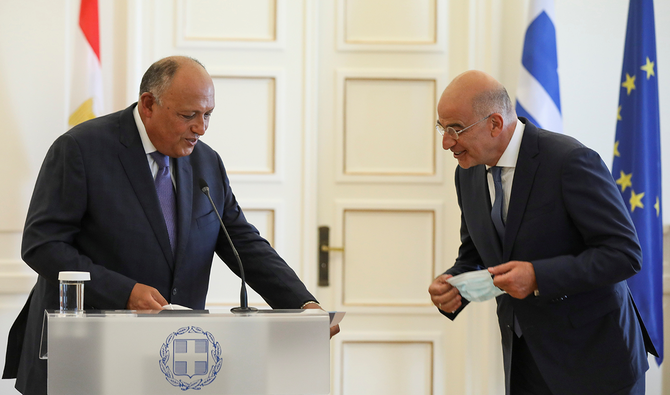CAIRO: Egyptian Foreign Minister Sameh Shoukry on Tuesday arrived in the Greek capital Athens for an official visit amid heightened tensions over Turkish maritime border claims in the Eastern Mediterranean.
The ongoing territorial dispute was expected to be among the top regional and international issues up for discussion during several days of talks aimed at further strengthening cooperation and coordination between the two countries.
As well as meeting with the Greek president, prime minister, and his ministerial counterpart, Shoukry was also due to take part in the 24th annual roundtable conference, organized by The Economist group, at which European and Eastern Mediterranean matters would be on the agenda.
Cairo and Athens recently signed an agreement to demarcate maritime borders, a move strongly criticized by Turkey which has been conducting energy exploration operations in the Eastern Mediterranean in the face of Greek protests.
Last year, Turkey angered Egypt and Greece by signing a security and military accord setting out new maritime boundaries and authorizing Ankara to intervene militarily in Libya, which Cairo considered a threat to its national security and the stability of the region as a whole.
Greece and Egypt have continued to condemn Turkey’s violations in Mediterranean waters where Turkish President Recep Tayyip Erdogan has been pursuing an expansionary policy which has placed the Greeks on the front line.
“Turkey is the only country that opens war fronts everywhere, and it is the only country that threatens its neighboring countries with war if they choose to exercise their legal rights. It blatantly violates the UN Charter,” said Greek Foreign Minister Nikos Dendias.
On Sunday, Shoukry said that his country was waiting for actions from Turkey, not words, in response to statements made by Yasin Aktay, an adviser to Erdogan, about the importance of rapprochement between Cairo and Ankara.
“If Turkey’s statements do not coincide with its actions, they are irrelevant ... Ankara’s expansionist policy destabilizes the region,” Shoukry added.
The minister pointed out that Turkish military presence in Libya and Iraq, and its behavior in the Eastern Mediterranean, threatened regional stability and was not conducive to dialogue and understanding.
























